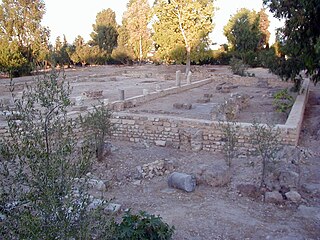Eugenius (died 394) was a 4th-century Roman emperor.
Contents
Eugenius may also refer to:
Eugenius (died 394) was a 4th-century Roman emperor.
Eugenius may also refer to:
Four popes have been named Eugenius:
Flavian may refer to:
Pope Eugene I was the bishop of Rome from 10 August 654 to his death. He was chosen to become Pope after the deposition and banishment of Martin I by Emperor Constans II over the dispute about Monothelitism.
The 430s decade ran from January 1, 430, to December 31, 439.
The 390s decade ran from January 1, 390 to December 31, 399

Pope Vitalian was the bishop of Rome from 30 July 657 to his death. His pontificate was marked by the dispute between the papacy and the imperial government in Constantinople over Monothelitism, which Rome condemned. Vitalian tried to resolve the dispute and had a conciliatory relationship with Emperor Constans II, who visited him in Rome and gave him gifts. Vitalian's pontificate also saw the secession of the Archbishopric of Ravenna from the papal authority.
Saint Eugene, Saint Eugenius or Saint-Eugène may refer to:
There were several kings of Strathclyde, Cumbria or Alt Clut whose names are sometimes given as Owain, Owen, Eógan and so on.

Ignatius of Constantinople was the Ecumenical Patriarch of Constantinople from 847 to 858 and from 867 to 877. Ignatius lived during a complex time for the Byzantine Empire. The Iconoclast Controversy was ongoing, Boris I of Bulgaria converted to Christianity in 864, and the Roman pontiffs repeatedly challenged the ecclesiastical jurisdiction of the Eastern Church in Bulgaria. As patriarch, Ignatius denounced iconoclasm, secured jurisdiction over Bulgaria for the Eastern Church, and played an important role in conflicts over papal supremacy.
Éogan is an early Irish male given name, which also has the hypocoristic and diminutive forms Eoganán, Eóghainin, Eóghain and Eóghainn. The Modern Irish form of the name is Eoghan.

The Archdiocese of Granada is a Latin ecclesiastical province of the Catholic Church in Spain. Originally the Diocese of Elvira from the 3rd century through the 10th, it was re-founded in 1437 as the diocese of Granada and was elevated to the rank of a metropolitan archdiocese by Pope Alexander VI on 10 December 1492. Its suffragan sees are Almería, Cartagena, Guadix, Jaén and Málaga.
Paul II the Black, also known as Paul of Bēth Ukkāme, was the Patriarch of Antioch and head of the Syriac Orthodox Church from c. 551 or 564 to his deposition in 578. He succeeded Sergius of Tella as the spiritual leader of the Syrian non-Chalcedonians, in opposition to the Chalcedonian Imperial Church, and led the nascent Syriac Orthodox Church as it endured division and persecution.
Saint Eugenius II, sometimes called Eugenius the Younger as the successor of Eugenius I, was Archbishop of Toledo from 647 until his death.

The Lateran Council of 649 was a synod held in the Basilica of St. John Lateran to condemn Monothelitism, a Christology espoused by many Eastern Christians, and Pope Honorius. The Council did not achieve ecumenical status in either East or West, but represented the first attempt of a pope to convene an ecumenical council independent of the Roman emperor.
Owain is a name of Welsh origin, variously written in Old Welsh as Ougein, Eugein, Euguen, Iguein, Ou(u)ein, Eug(u)ein, Yuein, and in Middle Welsh as Ewein, Owein, and Ywein. Other variants of the name Owain include Ewein, Iguein, Owein, Ouein, Ywen, Ywein, Ywain, Yuein, and Yvain. Owain has also been Latinized as Oenus.
Christianity is an Abrahamic monotheistic religion based on the life and teachings of Jesus as interpreted in the Bible. It is the largest religion in the world, with 2.4 billion people, known as Christians, that adhere to the religion.
Eógan of Strathclyde may refer to:

The Archdiocese of Carthage, also known as the Church of Carthage, was a Latin Catholic diocese established in Carthage, Roman Empire, in the 2nd century. Agrippin was the first named bishop, around 230 AD. The temporal importance of the city of Carthage in the Roman Empire had previously been restored by Julius Caesar and Augustus. When Christianity became firmly established around the Roman province of Africa Proconsulare, Carthage became its natural ecclesiastical seat. Carthage subsequently exercised informal primacy as an archdiocese, being the most important center of Christianity in the whole of Roman Africa, corresponding to most of today's Mediterranean coast and inland of Northern Africa. As such, it enjoyed honorary title of patriarch as well as primate of Africa: Pope Leo I confirmed the primacy of the bishop of Carthage in 446: "Indeed, after the Roman Bishop, the leading Bishop and metropolitan for all Africa is the Bishop of Carthage."
Eugenius of Toledo may refer to: